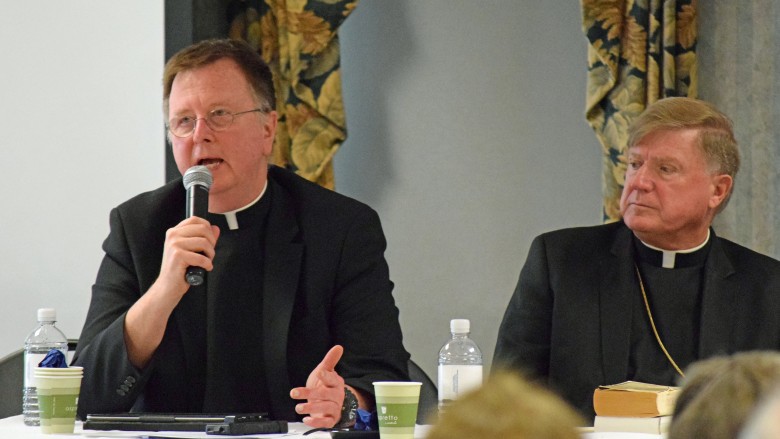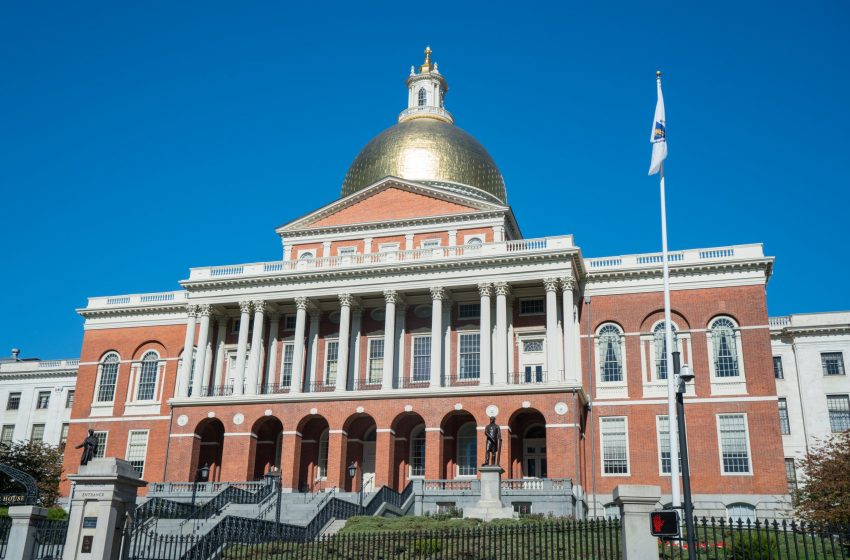Catholics organize to oppose assisted suicide measure
By Kara Bettis | November 3, 2015, 14:33 EST
 Father Myles Sheehan, left, talks to a Catholic group at a pro-life conference Oct. 27 at Assumption College while Worcester Bishop Robert J. McManus looks on. (Kara Bettis)
Father Myles Sheehan, left, talks to a Catholic group at a pro-life conference Oct. 27 at Assumption College while Worcester Bishop Robert J. McManus looks on. (Kara Bettis) BOSTON – After Massachusetts voters in 2012 rejected a measure (51 percent to 49 percent) that would have legalized doctor-prescribed suicide, the Archdiocese of Boston decided to ramp up efforts to promote compassionate end-of-life care as an alternative to suicide. In March 2015, the Initiative on Palliative Care and Advance Care Planning was born.
The Initiative, which seeks to educate the public about compassionate care options and health care decision-making for the seriously ill, has its work cut out for it: today, the Massachusetts legislature is considering a bill (HB 1991) similar to the one voters rejected three years ago. If the measure passes, the state will join California, Montana, Vermont and Washington in letting the sick and dying end their lives with the help of a physician.
Once again, Catholics in the commonwealth are gearing up to oppose the measure.
The Roman Catholic Church has long opposed the practice of euthanasia, or doctor-assisted suicide. Last month, when California Governor Jerry Brown, a Democrat, signed into law a bill authorizing the practice in the Golden State, Boston Cardinal Seán O’Malley, who chairs the Committee on Pro-Life Activities of the U.S. Conference of Catholic Bishops (USCCB), called the action “a great tragedy for human life … compounded by confusion among those who supported this law.”
Attorney-nurse-bioethicist M.C. Sullivan, who runs the Archdiocese’s Initiative on Palliative Care and Advance Care Planning, argues that palliatives offer many of the same benefits that the terminally seek in ending their lives – primarily, pain management and control. But Sullivan believes that the benefits of such treatments are more holistic – using the patient’s beliefs and values as a foundation, a palliative plan offers spiritual, psychological, social, as well as physical, care.
Sullivan, who speaks about end-of-life care to groups around the country, is unaware of any other diocese with a similar initiative – although many have reached out to Sullivan to get ideas.
“This a topic that touches all of us, in our real lives and as citizens,” Sullivan said. “We need to have as much information out there – solidarity, resources, extraordinary ways – as possible.”
The personal and spiritual aspects of the assisted suicide debate were presented at a forum at Assumption College in Worcester on Oct. 17 in which a couple hundred Catholic leaders and lay people gathered to discuss the subject.
The Rev. Myles Sheehan, a Jesuit priest and former director of geriatric consultation services at Boston’s Beth Israel Deaconess Medical Center, said at the forum that the federal health-care system favors doctor-prescribed suicide as a rationing measure.
“It’s viewed as a reasonable alternative by good people,” he said. “The reimbursement system favors doing things and not listening to people.”
Sheehan added that there is an appropriate way for those who are suffering to let go and to be made comfortable. But he took issue with the notion that choosing to die constitutes “death with dignity.”
“We have this nutty idea about dignity,” Sheehan said, adding that the notion is “the narrative of assisted suicide that I’m most afraid of – that old people will believe they’re a burden and that dying a natural death is not dignified.”
Massachusetts Citizens for Life, an organization that opposes abortion and assisted suicide, has held a series of public meetings around the state to present its views on the ramifications of the bill, introduced by state Rep. Louis Kafka (D-Stoughton). Linda Thayer, the secular group’s vice president for educational affairs and a volunteer speaker for the Archdiocese of Boston, calls the choice to die “dangerous.”
Thayer speaks to thousands of adults and students annually. She estimates she has addressed about 250,000 New Englanders since the 1980s, mostly in church groups.
But for Thayer, who is Catholic, the issue is one of science and morality, not necessarily faith.
“It’s not a Catholic issue,” she said, voicing a view held by many Catholic leaders. “It’s a very human issue. A truly compassionate society wants to be with those who are hurting and vulnerable … doctor-prescribed suicide is society’s way of abandoning people who are hurting.”
Thayer argues that most of the reasons that people seek out doctor-assisted suicide – pain, suffering, loneliness, depression and a lack of affordable health care – can be dealt with in more compassionate ways.
“Nobody wants to die,” she said.
Thayer’s father passed away in 2011, after living almost three years longer than doctors had expected. She said those final years were vital to their once-estranged relationship and she would never trade them.
But mostly, she’s concerned for the poor. Thayer cited the 2008 case of Oregon resident Barbara Wagner, who was denied insurance coverage for chemotherapy cancer treatments but not for physician-induced suicide.
“People of lesser economic means should be worried about this,” she said. “They probably don’t have coverage for hospice, palliative care, etc., but they will be covered for doctor-assisted suicide. Their choices are limited.”
Contact Kara Bettis at [email protected] or @karabettis
NBPValueoflife










